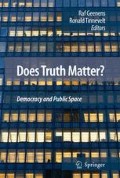Not only have the Greeks given us our word for democracy, which means literally that ‘ kratos' is in the hands of the ‘ demos’; we have also inherited from them a barely less noteworthy set of spatial distinctions. The most important of these are between ‘ oikos’, ‘ agora’ and ‘ ekklesia’. Each defines a space with its own logic.1 The oikos is the sphere of the private household, where one is shielded against the effects of political power. The agora is the market place, in which commercial transactions take place and private and public affairs can be discussed. The ekklesia, finally, refers to the formally organized political sphere, wherein citizens convene to make collectively binding decisions.
Some compelling arguments can be made by thinking of these spatial distinctions first and foremost as metaphors that should not be understood literally as physical spaces. As such, they can refer to three distinct epistemic attitudes. First there is the stance that comes with solipsistic thought, and which is characterized by unrestricted yet dangerously claustrophobic freedom. Then there is the looser attitude that one enjoys in conversation with friends and peers, where uncharted ideas can be explored and one can change one's mind without losing face. Finally, with the rigid and formalized attitude of public speech, one's ideas and words are of necessity somewhat restrained, so that they can be justified to all.
Access this chapter
Tax calculation will be finalised at checkout
Purchases are for personal use only
Preview
Unable to display preview. Download preview PDF.
References
Arendt, H. (1958). The Human Condition. Chicago, IL: Chicago University Press
Arendt, H. (1976). The Origins of Totalitarianism. San Diego, CA: Harcourt Brace
Arendt, H. (1993). Between Past and Future: Eight Exercises in Political Thought. New York: Penguin
Bach, J. and Stark, D. (2004). Link, Search, Interact. The Co-evolution of NGOs and Interactive Technology. Theory, Culture&Society, 21(3), 101–117
Castoriadis, C. (1997). Democracy as Procedure and Democracy as Regime. Constellations, 4(1), 1–18
Detienne, M. (2001). Public Space and Political Autonomy in Early Greek Cities. In M. Hénaffand T. B. Strong (Eds.), Public Space and Democracy. Minneapolis, MN: University of Minnesota Press, pp. 41–52
Dewey, J. (1927). The Public and Its Problems. Athens, OH: Swallow Press
Estlund, D. (1998). The Insularity of the Reasonable: Why Political Liberalism Must Admit the Truth. Ethics, 108(2), 252–275
Fraser, N. (2005). Re-framing Justice in a Globalizing World. New Left Review, 36, 69–88
Gutmann, A. and Thompson, D. (1996). Democracy and Disagreement. Cambridge, MA: Harvard University Press
Habermas, J. (1989). The Structural Transformation of the Public Sphere: An Inquiry into a Category of Bourgeois Society. Cambridge, UK: Polity Press
Held, D. (1995). Democracy and the Global Order: From the Modern State to Cosmopolitan Governance. Cambridge, MA: Polity Press
Hohendahl, P. U. (2000). Die Entstehung der modernen Öffentlichkeit im Zusammenhang mit der Entstehung des modernen Publikums. In P. U. Hohendahl (Ed.), Öffentlichkeit. Geschichte eines kritischen Begriffs. Stuttgart & Weimar: Metzler, pp. 8–37
Holmes, S. (1988). Gag Rules or the Politics of Omission. In J. Elster and R. Slagstad (Eds.), Constitutionalism and Democracy. Cambridge: Cambridge University Press, pp. 19–58
Keck, M. and Sikkink, K. (1998). Activists Beyond Borders: Advocacy Networks in International Politics. Ithaca, NY: Cornell University Press
Kilian, T. (1998). Public and Private, Power and Space. In A. Light and J. M. Smith (Eds.), Philosophy and Geography II. The Production of Public Space. Lanham/Boulder/New York/ London: Rowman&Littlefield, pp. 115–134
Lefebvre, H. (1991). The Production of Space. Cambridge, MA/Oxford: Blackwell
Mitchell, D. (2003). The Right to the City: Social Justice and the Fight for Public Space. New York/London: The Guilford Press
Payne, A. (2000). Globalization and Modes of Regionalist Governance. In J. Pierre (Ed.), Debating Governance: Authority, Steering and Democracy. Oxford: Oxford University Press, pp. 201–218
Plato (2000). The Republic, G. R. F. Ferrari (Ed.). Cambridge: Cambridge University Press
Rawls, J. (1996). Political Liberalism. New York: Columbia University Press
Raz, J. (1990). Facing Diversity: The Case of Epistemic Abstinence. Philosophy and Public Affairs, 19(1), 3–46
Rischard, J. (2002). High Noon: Twenty Global Problems, Twenty Years to Solve Them. New York: Basic Books
Rosenau, J. N. and Czempiel, E. (Eds.) (1992). Governance Without Government: Order and Change in World Politics. Cambridge: Cambridge University Press
Rosenau, J. (2004). Strong Demand, Huge Supply: Governance in an Emerging Epoch. In I. Bach and M. Flinders (Eds.), Multi-level Governance. Oxford: Oxford University Press, pp. 31–48
Sennett, R. (1994). Flesh and Stone: The Body and the City in Western Civilization. New York: W. W. Norton
Slaughter, A. (2004). A New World Order. Princeton, NJ: Princeton University Press
Soja, E. (1989). Postmodern Geographies. The Reassertion of Space in Critical Theory. Oxford: Blackwell
Sorkin, M. (1992). See You in Disneyland. In M. Sorkin (Ed.), Variations on a Theme Park: The New American City and the End of Public Space. New York: Hill & Wang, pp. 205–232
Author information
Authors and Affiliations
Editor information
Editors and Affiliations
Rights and permissions
Copyright information
© 2009 Springer Science + Business Media B.V
About this chapter
Cite this chapter
Geenens, R., Tinnevelt, R. (2009). Truth and Public Space: Setting Out Some Signposts. In: Geenens, R., Tinnevelt, R. (eds) Does Truth Matter?. Springer, Dordrecht. https://doi.org/10.1007/978-1-4020-8849-0_1
Download citation
DOI: https://doi.org/10.1007/978-1-4020-8849-0_1
Publisher Name: Springer, Dordrecht
Print ISBN: 978-1-4020-8848-3
Online ISBN: 978-1-4020-8849-0
eBook Packages: Humanities, Social Sciences and LawPhilosophy and Religion (R0)

